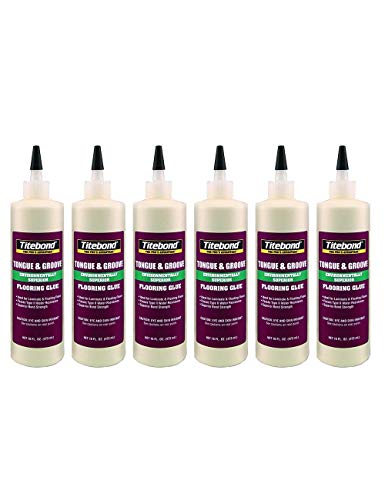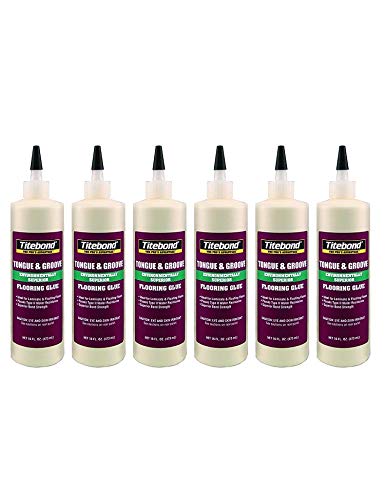Best Glue For Hardwood Floors (2024 Update)
When it comes to installing hardwood floors in your home, having the right adhesive is crucial for getting a long-lasting, high-quality result. With so many glue options on the market, it can be overwhelming trying to determine which product is best for your project. Before purchasing wood flooring adhesive, there are a few key factors you should consider.
First, examine the type of hardwood you’ll be installing. Certain adhesives are specially formulated for different wood species. You’ll want an adhesive that’s compatible with your flooring material to ensure proper bonding and longevity. It’s also important to note whether your hardwood will be installed below, on, or above grade, as climate conditions require different adhesive characteristics.
Additionally, consider who will be walking on the finished floor. Is this a high-traffic area that will need to withstand heavy foot traffic? Or is it a seldom-used room requiring only light duty adhesion? Your intended use will determine the strength and dry time requirements of the adhesive. Thinking ahead about foot traffic patterns helps narrow your adhesive options.
Got your interest piqued about finding the perfect glue for your next hardwood flooring project? Here are some key questions to ask yourself when researching adhesives: What type of climate will my floors be exposed to? How durable does the bond need to be for my application? Do I want a water-resistant adhesive? Getting the answers right ensures you select the ideal adhesive for flawless, long-lasting hardwood floors.
10 Best Glue For Hardwood Floors
| # | Product Image | Product Name | Product Notes | Check Price |
|---|---|---|---|---|
|
1
|
It is ideal for installing laminate and floating flooring.
|
|
||
|
2
|
Ideal for installing tongue and groove flooring, providing a strong bond and easy application.
|
|
||
|
3
|
The product is ideal for repairing damaged wood floors professionally and effectively.
|
|
||
|
4
|
Ideal for bonding tongue and groove flooring and fitting together wood pieces with a tight, solid fit.
|
|
||
|
5
|
Ideal for floor adhesive, suitable for use with a variety of flooring materials including vinyl, linoleum and rubber.
|
|
||
|
6
|
Gorilla Wood is ideal for outdoor projects such as decks, fences, and furniture due to its durability and resistance to decay.
|
|
||
|
7
|
The product is ideal for bonding and repairing wood surfaces such as furniture, cabinets, and trim.
|
|
||
|
8
|
Ideal for installing tongue and groove flooring.
|
|
||
|
9
|
The product is ideal for installing engineered wood flooring.
|
|
||
|
10
|
The product is ideal for repairing and filling gaps in wooden floors.
|
|
1. Mannington Megaglue Laminate & Floating Flooring Adhesive 16oz
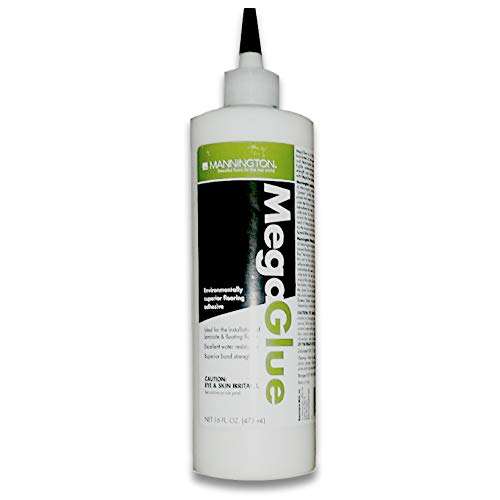
This premium adhesive is designed for gluing tongue and groove boards, specifically the Mannington Mega T&G System. The adhesive is PVAC-based, which provides a strong, durable bond between the boards. With a coverage of 100 square feet, this adhesive is perfect for medium to large flooring projects.
The Mannington Mega T&G System is a popular choice for those who want a high-quality, durable flooring system. This adhesive is specifically designed for use with this system, ensuring a perfect fit and maximum bond strength.
The PVAC-based adhesive is known for its excellent bonding properties, making it a reliable choice for any flooring project. It provides a strong and durable bond that will last for years to come, even under heavy foot traffic.
With a coverage of 100 square feet, this adhesive is perfect for medium to large flooring projects. It is easy to apply and dries quickly, making it a convenient choice for both professionals and DIY enthusiasts.
2. Titebond Tongue & Groove Flooring
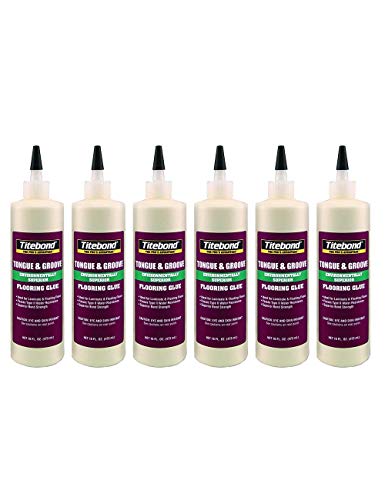
This product is specifically designed to provide exceptional results for engineered wood and laminate floors. With its Type II water resistance, this product is the perfect solution for areas with high levels of moisture. The superior bond strength ensures that the flooring will remain in place for years to come.
In addition to its impressive performance, this product is also environmentally superior. It is made with sustainable materials that minimize its impact on the environment while still delivering excellent results.
Each 16 oz bottle of this product can cover approximately 200LF at a 1/8" bead, making it a cost-effective solution for any flooring project. With its easy-to-use design and impressive results, this product is a must-have for anyone looking to install or repair engineered wood or laminate floors.
3. Dritac 32 Fl Oz. Professional Wood Floor Repair Adhesive 2 Pack
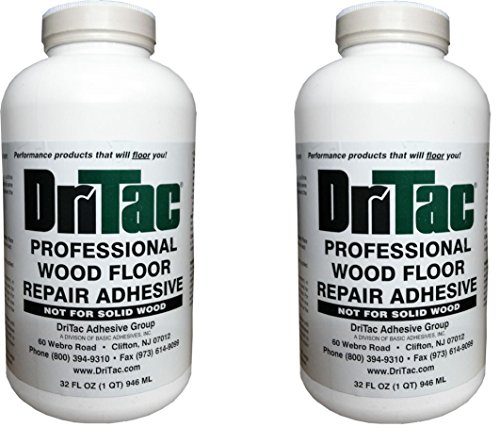
DriTac offers an innovative repair system designed to address the common issues of hollow spots and popping sounds in engineered wood flooring installations. This particular system proves to be effective where other adhesives have failed in the past, providing a reliable solution to homeowners and flooring professionals alike.
Research and practical experience have shown that one of the primary reasons for hollow spots and popping sounds in engineered wood floors is the presence of adhesive voids between the flooring and the subfloor. These voids can occur during the installation process and can ultimately lead to the failure of the adhesive bond.
Fortunately, DriTac's repair system is engineered to fill these voids, resulting in a stronger and more secure bond between the flooring and the subfloor. This system offers an easy-to-use solution to repair hollow spots and popping sounds in engineered wood floors, saving homeowners and flooring professionals time and money.
With DriTac's repair system, users can feel confident in the long-term durability and stability of their engineered wood flooring installations. The product's parameters and specifications have been meticulously developed to ensure its efficacy and ease of use.
4. Ww Henry Company 356-040 Ardex/henry-12073-1 Gallon Ardex Lp 12073 Gal #356 Flr Adhesive
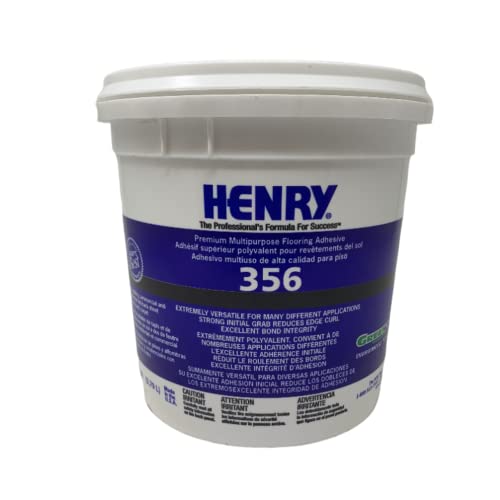
Introducing the Henry, WW Company GAL #356 FLR Adhesive 12073, an exceptional adhesive floor and carpet solution that is a must-have for all your painting supplies, abrasives, and surface preparation accessories. Proudly manufactured in the United States, this top-quality product is brought to you by the reputable brand, WW Henry Company.
This adhesive floor and carpet product is designed to provide a strong, reliable bond that can withstand heavy foot traffic, making it ideal for both commercial and residential use. Its exceptional bonding properties ensure that your carpet and flooring stays securely in place for long periods, without the need for constant repairs and maintenance.
The Henry, WW Company GAL #356 FLR Adhesive 12073 boasts impressive specifications and parameters that make it stand out from other adhesive products on the market. Its high solids content ensures excellent coverage, while its low VOC formula makes it environmentally friendly and safe to use. Additionally, it is easy to apply, dries quickly, and delivers a smooth, professional finish that enhances the overall appearance of your flooring.
This adhesive floor and carpet product is versatile and can be used on a variety of surfaces, including concrete, plywood, and terrazzo. Its impressive holding power ensures that it can be used for both indoor and outdoor applications, providing a reliable, long-lasting bond that can withstand harsh weather conditions.
5. Gorilla Wood
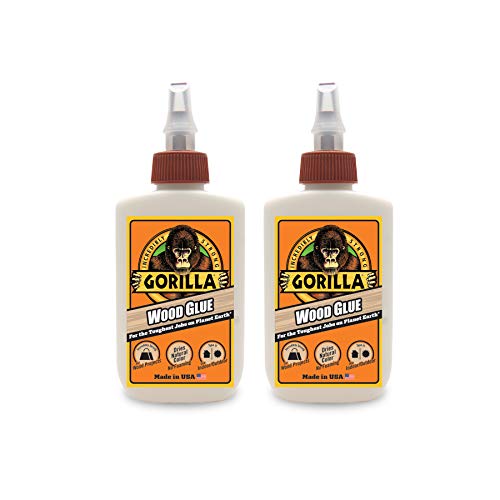
Looking for a reliable and versatile adhesive for your woodworking projects? Look no further than this high-quality wood glue. With a fast clamp time of just 20-30 minutes and full curing in 24 hours, this glue helps you complete your projects quickly and efficiently.
Not only is this glue fast and strong, it's also versatile and suitable for use both indoors and outdoors. It passes ANSI/HPVA Type II water resistance, making it a great choice for all sorts of woodworking projects and repairs. Whether you're working with hardwoods, softwoods, or natural wood composites, this glue is up to the task.
One of the many benefits of this wood glue is its natural color, which offers a seamless bond line with no foaming. Plus, it's paintable and sandable, so you can easily customize the color and finish of your project as needed.
Using this glue couldn't be easier, thanks to its water-based, PVA formulation. Clean-up is a breeze with warm soap and water, and excess glue can be wiped away with a wet cloth or scraped off once it's dried.
To use this wood glue, simply clean and dry the surfaces to be bonded, apply the glue generously, and clamp the parts together for 20-30 minutes. The parts should fit tightly, and any excess glue can be removed with a clean, wet cloth or scraped off after the glue has dried. Once the bond has dried for 24 hours, you can remove the applicator tip to clean out any glue build-up, then close the cap and store the glue at room temperature.
6. Elmer's Products E7000 Carpenters Wood
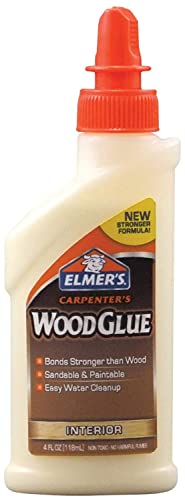
This high-quality glue is a versatile tool for carpentry and home repairs. With a 4 oz bottle, it is perfect for small and medium-sized projects. The glue is non-toxic and does not emit any harmful fumes, making it safe to use in any environment. It is also easy to clean up with just soap and water when the glue is wet.
The glue has a 20 to 30 minute clamp time, allowing for sufficient time to make adjustments before it dries. A full bond is achieved within 24 hours, resulting in a strong and durable bond that is even stronger than wood. This makes it ideal for use on soft and hardwoods, particle board, and porous materials.
The glue has a light color that blends well with natural and light stained woods. When dry, it has a yellow color that complements the wood's natural beauty. It is paintable, but not stainable, allowing for creative customization without sacrificing the strength of the bond.
To clean up the glue when it is dry, simply scrape and sand the excess glue away. This ensures a clean and professional finish on any project. The glue is a reliable and effective adhesive that is perfect for both professionals and DIY enthusiasts.
7. Roberts 1407-1 Engineered Wood Flooring Adhesive, 1 Gallon , Beige
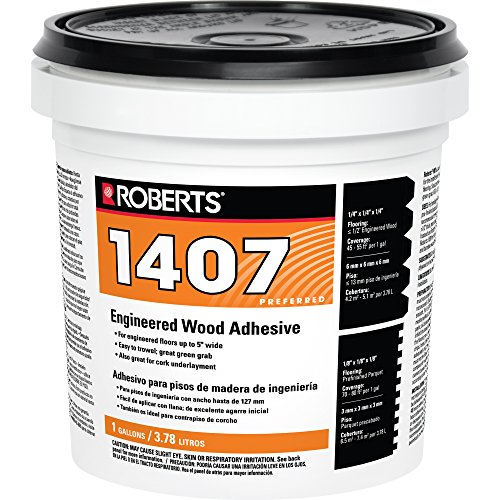
This adhesive is a versatile solution for engineered wood planks, plain back parquet flooring, and acrylic-impregnated planks that are up to 1/2 inch thick and 5 inches wide. It is designed for interior, direct bond installations and can be bonded with concrete (on and above grade), APA rated plywood, and acoustic cork underlayment.
This adhesive has a heavy residential and moderate commercial traffic rating, making it perfect for both residential and commercial settings. It offers up to 20 minutes of open time, 30 minutes of working time, and 24 to 48 hours of curing time.
When it comes to coverage, this adhesive offers approximately 45 to 55 and 70 to 80 square feet per gallon for engineered wood and prefinished parquet flooring installations, respectively. To apply, it is recommended to use a 1/4 inch x 1/4 inch x 1/4 inch V-notch trowel or a 1/8 inch x 1/8 inch x 1/8 inch square-notch trowel, depending on the installation type.
This adhesive is solvent-free and LEED compliant, with a VOC rating of less than 2 g/L and meets SCAQMD Rule 1168. Additionally, it is non-flammable, making it safe to use.
8. Dritac Professtional Wood Floor Repair Adhesive, 32 Fl. Oz.
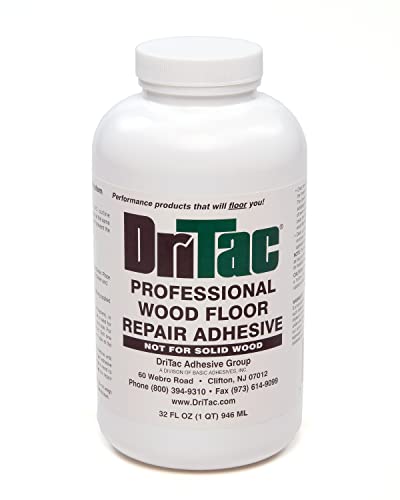
DriTac has come up with an innovative solution to fix the hollow spots and popping conditions that are commonly encountered during the installation of engineered wood flooring. Despite using various adhesives, these issues can persist, causing frustration for the installer and homeowner alike.
Extensive research and real-world experience have shown that one of the primary reasons for these problems is the presence of adhesive voids between the flooring and the subfloor. DriTac's repair system effectively addresses this issue and provides a reliable and durable solution that ensures a smooth and stable flooring surface.
With DriTac's repair system, you can expect a hassle-free installation process, as it is easy to apply and provides excellent bonding strength. It is specially formulated to work with a wide range of engineered wood flooring products, making it a versatile and practical choice for any project.
Best Glue For Hardwood Floors FAQs
Can I use regular wood glue for hardwood floors?
No, regular wood glue should not be used for hardwood floors. Hardwood flooring requires a specific type of adhesive that is designed for use with hardwood. Using regular wood glue can result in a weak bond, which can cause the flooring to separate or buckle over time.
There are several types of adhesives that are suitable for hardwood floors, including urethane and epoxy adhesives. These adhesives provide a strong, durable bond that can withstand the constant weight and pressure of foot traffic.
It is important to follow the manufacturer's instructions when selecting and applying an adhesive for hardwood floors. Additionally, it is recommended to consult with a professional flooring installer to ensure that the adhesive is applied correctly and that the flooring is installed properly.
In summary, regular wood glue should not be used for hardwood floors. Instead, a specific type of adhesive designed for hardwood should be selected and applied according to the manufacturer's instructions and with the help of a professional installer.
Do I need to use a moisture-resistant glue for hardwood floors?
When it comes to installing hardwood floors, it is important to use the right type of glue to ensure that the flooring stays in place and lasts for a long time. Moisture-resistant glue is a good option for hardwood floors, especially in areas that are prone to moisture such as bathrooms and kitchens. This type of glue is designed to withstand exposure to moisture and prevent the hardwood from warping or buckling due to changes in humidity levels.
However, it is important to note that not all hardwood floors require moisture-resistant glue. If you are installing hardwood in a dry area of your home, such as a bedroom or living room, you may be able to use a standard wood glue. It is always best to check with the manufacturer's recommendations for the specific type of hardwood flooring you are installing to ensure that you are using the appropriate type of glue.
Overall, using moisture-resistant glue for hardwood floors is a good idea if you want to ensure that your flooring lasts for a long time and is resistant to moisture damage.
How do I choose the right glue for my hardwood floors?
Choosing the right glue for your hardwood floors can be a daunting task, as there are several types of adhesives available on the market. However, there are a few key factors you should consider before making your decision.
Firstly, it's important to determine whether your hardwood flooring is solid or engineered. Solid hardwood floors require a different type of glue compared to engineered hardwood floors.
Secondly, consider the moisture level of your subfloor. If your subfloor is concrete, you'll need a moisture-resistant glue.
Thirdly, consider the type of installation method you'll be using. If you're installing the hardwood floors using the glue-down method, you'll need a flooring adhesive that provides a strong bond and dries quickly.
Lastly, consider the VOC content of the adhesive. If you're environmentally conscious, you may want to choose a glue with low VOC content.
Overall, choosing the right glue for your hardwood floors requires careful consideration of your specific needs and preferences. Consult with a professional flooring installer or manufacturer for advice on the best adhesive for your particular situation.
How do I properly prepare the subfloor before applying glue for hardwood floors?
Proper preparation of the subfloor is crucial for a successful hardwood floor installation. Before applying glue, you need to ensure that the subfloor is clean, dry, level, and structurally sound.
First, remove any existing flooring and debris from the subfloor. Next, check for any protruding nails or screws and remove them or drive them below the surface of the subfloor.
Inspect the subfloor for any signs of moisture or water damage. If there are any issues, address them before proceeding with the installation.
Make sure the subfloor is level by using a leveling compound or sanding down high spots. A level subfloor will prevent gaps or unevenness in the hardwood floor.
Lastly, ensure that the subfloor is structurally sound and can support the weight of the hardwood floor. This may require reinforcing the subfloor with additional joists or plywood.
By properly preparing the subfloor before applying glue, you can ensure a smooth and long-lasting hardwood floor installation.
How long does it take for glue to dry when installing hardwood floors?
The drying time for glue when installing hardwood floors can vary depending on several factors, such as the type of glue used, the temperature and humidity of the environment, and the amount of glue applied. Typically, it can take anywhere from 24 to 48 hours for the glue to completely dry and cure. However, it's important to follow the manufacturer's instructions for the specific type of glue being used, as some may require longer drying times. It's also important to ensure that the environment is properly ventilated and maintained at a consistent temperature and humidity level to avoid any delays in the drying process. Rushing the drying process can lead to subpar results and potentially damage the hardwood flooring. Therefore, it's crucial to allow enough time for the glue to dry completely before walking on or installing any further flooring materials.
Is polyurethane adhesive the best glue for hardwood floors?
Polyurethane adhesive is one of the best options for hardwood floor installation. It is a type of glue that creates a strong and durable bond between the hardwood and the subfloor. Polyurethane adhesive is waterproof and flexible, which makes it perfect for areas with high humidity or temperature changes. This adhesive is also resistant to chemicals and solvents, ensuring that it will not break down over time.
Additionally, polyurethane adhesive has a longer working time than other adhesives, which gives the installer more time to adjust and position the hardwood before the glue sets. It is also easy to clean up with just soap and water.
However, it is important to note that not all polyurethane adhesives are created equal. It is essential to choose a high-quality adhesive that is specifically designed for hardwood floor installation. It is also crucial to follow the manufacturer's instructions carefully to ensure a successful installation.
Overall, polyurethane adhesive is an excellent choice for hardwood floor installation due to its strength, durability, and flexibility.
What are the pros and cons of using different types of glue for hardwood floors?
When it comes to installing hardwood floors, choosing the right type of glue is crucial for ensuring a long-lasting and secure installation. Here are some pros and cons of using different types of glue for hardwood floors:
1. Polyurethane glue: This type of glue is known for its excellent bonding strength and resistance to moisture. It also has a longer working time, allowing for more precise installation. However, it can be more expensive than other types of glue and may require longer drying times.
2. Epoxy glue: Epoxy glue is a popular choice for hardwood floor installation due to its strong bonding properties and durability. It is also resistant to moisture and chemicals. However, it can be difficult to work with and may require special mixing and application techniques.
3. PVA glue: PVA glue is a cost-effective option for hardwood floor installation. It is easy to work with and dries quickly. However, it may not be as strong as other types of glue and can be more susceptible to moisture damage.
Ultimately, the choice of glue will depend on factors such as the type of hardwood being installed, the level of moisture in the room, and personal preference. It is important to carefully consider the pros and cons of each type of glue before making a decision.
What is the best method for applying glue when installing hardwood floors?
The best method for applying glue when installing hardwood floors depends on the type of glue being used. For tongue-and-groove flooring, it is recommended to use a urethane-based adhesive that is specifically designed for hardwood floor installation. This type of adhesive is applied using a trowel, and the recommended trowel size and spread rate should be followed according to the manufacturer's instructions.
When applying the adhesive, it is important to work in small sections to ensure the glue does not dry out before the flooring is installed. The adhesive should be spread evenly and consistently, and excess glue should be immediately cleaned up with a damp cloth.
For floating floor installations, a floating floor adhesive can be used, which is applied in a similar manner using a trowel. It is important to follow the manufacturer's instructions for spread rate and trowel size to ensure proper adhesion.
In summary, the best method for applying glue when installing hardwood floors is to use the appropriate adhesive for the type of flooring being installed and to follow the manufacturer's instructions for application. Working in small sections and cleaning up excess glue immediately will also help to ensure a successful installation.
What is the difference between water-based and solvent-based hardwood floor adhesives?
Water-based and solvent-based hardwood floor adhesives are two types of adhesives used for installing wooden flooring. The main difference between these two adhesives is the solvent used to dissolve the adhesive components.
Water-based adhesives are composed of synthetic or natural polymers that are dissolved in water. They are eco-friendly, low in odor, and easy to clean up. They are also considered to be less toxic than solvent-based adhesives. However, they take longer to dry and are not as durable as solvent-based adhesives.
Solvent-based adhesives use solvents such as toluene, xylene, or petroleum-based solvents to dissolve the adhesive components. They are known for their quick-drying capabilities and strong bonding strength. However, they are more toxic, emit strong fumes, and can be difficult to clean up.
The choice between water-based and solvent-based adhesives depends on personal preference, environmental concerns, and the type of flooring being installed. It is important to consider the pros and cons of each type of adhesive before making a decision. It is also recommended to follow the manufacturer's instructions for proper application and safety precautions.
What type of glue is best for hardwood floor installation?
When it comes to hardwood floor installation, choosing the right adhesive is crucial to ensure a strong and durable bond. The type of glue you choose will depend on the type of hardwood flooring you’re installing and the subfloor material.
For solid hardwood flooring, a moisture-cured polyurethane adhesive or a two-part epoxy adhesive is often recommended. These adhesives provide a strong bond and are resistant to moisture, making them ideal for use in areas with high humidity or moisture exposure.
For engineered hardwood flooring, a premium wood flooring adhesive that is specifically designed for use with engineered wood is recommended. These adhesives are typically water-based and provide a strong bond while also allowing for some flexibility, which is important for engineered wood floors.
It’s important to follow the manufacturer’s instructions carefully when applying the adhesive to ensure proper coverage and a strong bond. Additionally, be sure to allow the adhesive to fully cure before walking on or installing furniture on the newly installed hardwood floors.


